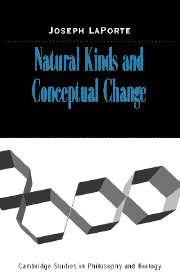Book contents
- Frontmatter
- Contents
- Preface
- Introduction
- 1 What Is a Natural Kind, and Do Biological Taxa Qualify?
- 2 Natural Kinds, Rigidity, and Essence
- 3 Biological Kind Term Reference and the Discovery of Essence
- 4 Chemical Kind Term Reference and the Discovery of Essence
- 5 Linguistic Change and Incommensurability
- 6 Meaning Change, Theory Change, and Analyticity
- Notes
- References
- Index
5 - Linguistic Change and Incommensurability
Published online by Cambridge University Press: 10 December 2009
- Frontmatter
- Contents
- Preface
- Introduction
- 1 What Is a Natural Kind, and Do Biological Taxa Qualify?
- 2 Natural Kinds, Rigidity, and Essence
- 3 Biological Kind Term Reference and the Discovery of Essence
- 4 Chemical Kind Term Reference and the Discovery of Essence
- 5 Linguistic Change and Incommensurability
- 6 Meaning Change, Theory Change, and Analyticity
- Notes
- References
- Index
Summary
In the past two chapters I have argued at some length that our use of natural-kind terms has changed over time as our scientific sophistication has increased. We continually refine our use of these terms in response to scientific research. For example, earlier speakers used the word ‘fish’ differently from the way we do. So we have not simply discovered that earlier speakers erred in accepting the sentence ‘Whales are fish’. Rather, we have changed what ‘Whales are fish’ means.
This sort of instability in language use arising from scientific inquiry may seem to cast doubt on whether there is rational progress in science. It may seem to suggest that today's scientific community is not really better informed or more advanced than earlier speakers in the investigation of kinds addressed by earlier speakers, for speakers today really address kinds other than those addressed by earlier speakers. Scientists of different periods appear to be studying the same kinds because later scientists retain the older kind terms of earlier scientists; but appearances mislead, because as time progresses, the older words lose their original meanings and come to mean something else entirely. This skeptical worry calls to mind Thomas Kuhn, Paul Feyerabend, and other proponents of the so-called “incommensurability thesis,” who insist that conceptual change is marked by linguistic change.
The causal theory of reference to natural kinds, as championed by Putnam and Kripke, is supposed to provide an answer to the threat of language instability posed by incommensurability theorists.
- Type
- Chapter
- Information
- Natural Kinds and Conceptual Change , pp. 112 - 149Publisher: Cambridge University PressPrint publication year: 2003

